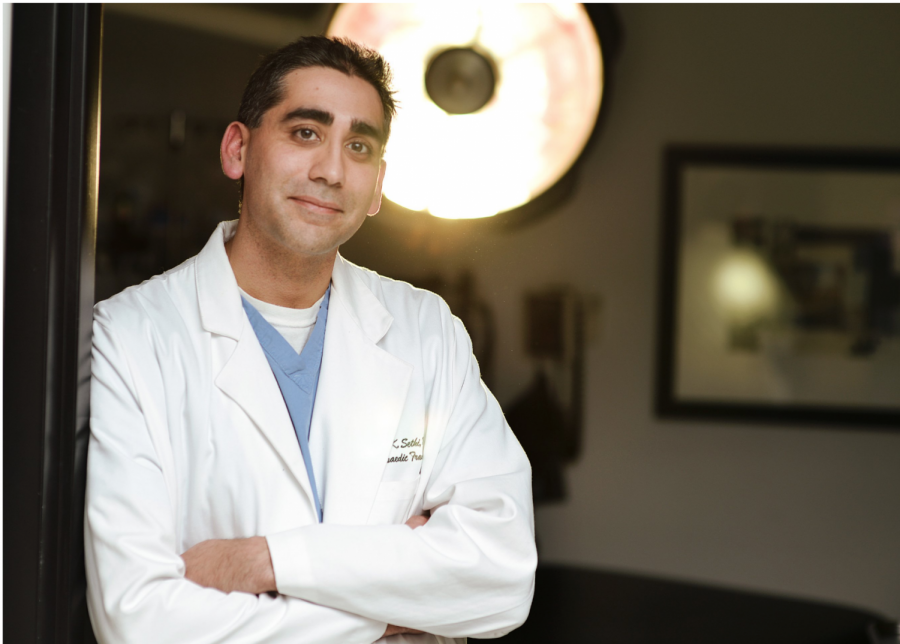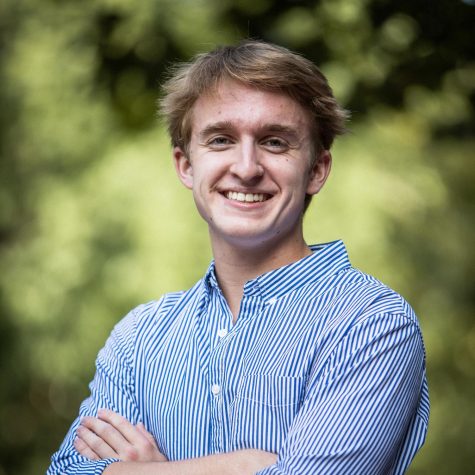Tennessee’s most high-profile election in 2020 will include a familiar face in the Vanderbilt community.
Dr. Manny Sethi, an orthopedic trauma surgeon at Vanderbilt University Medical Center, is running in 2020 for the U.S. Senate seat being vacated by three-term Tennessee Senator Lamar Alexander. Having announced his candidacy in June, Sethi, a Republican, will run in the Republican primary against Bill Hagerty.
Hagerty has served in roles including U.S. ambassador to Japan, Tennessee Economic and Community Development Commissioner and Tennessee chair of Trump Victory, the fundraising arm of President Trump’s 2016 campaign. The primary race is expected to be competitive after former Tennessee governor and current Vanderbilt distinguished visiting professor Bill Haslam declined to run. Hagerty also has Vanderbilt connections, having completed undergrad in 1981 and law school here in 1984.
Alternately, Sethi was born in Cleveland, Ohio in 1978 but raised in the small town of Hillsboro in middle Tennessee. He later attended Brown University and received a Fulbright Scholarship to help children suffering from muscular dystrophy in Tunisia. After graduating from Harvard Medical School in 2005, Sethi joined VUMC faculty in 2010. He is the author of “The American Dream in Tennessee,” which recounts his family’s immigration to the state and the co-author of “Introduction to Health Policy” with former Senate Majority Leader Bill Frist,
Sethi founded the health education nonprofit Health Tennessee in 2011. In 2017, Sethi became involved in politics at the national level, consulting President Trump on healthcare policy at the White House, speaking at a Trump rally in Nashville, and testifying before the Senate Committee on Health, Education, Labor & Pensions.
Below is a Q&A with Sethi about his Senate campaign and his message to the Vanderbilt community.
Vanderbilt Hustler: In your campaign video you said that “Medicine has always been our family’s way of saying thanks to America.” What have you taken from your career in medicine that drives you to public service?
Manny Sethi: Anybody who goes into that field does so because they want to help people. If you asked me when I applied to medical school why I wanted to be a doctor, it’s the same reason I want to run for the U.S. Senate: I want to really make a difference in people’s lives and help folks.
My dad was a primary care doctor and my mother was an OB-GYN in a very small town in Tennessee. They were really the only two doctors in that town. Early on in the 80s, I remember we used to pick up patients and take them to the hospital because there were only two ambulances. I learned the concept of service to others and the power of medicine to help people. Running for the U.S. Senate is really no different. It’s an opportunity to make a different kind of difference, to help millions of people just like I’ve helped people as a doctor.
VH: Are there any qualities that you attained as a doctor that would benefit a public role?
MS: As a trauma surgeon, you learn humility. You see life and death every day, you realize ego has very little place. You’re always driven to make a difference because you see that life is like a candle and can flip off at any moment. Life is so precious. You gotta make the biggest difference you can make.
This Sunday at three in the morning, I had to deal with a general surgeon, a vascular surgeon, we’re trying to make decisions and we all have opinions. You gotta make decisions very quickly. I think building consensus is what you have to do in the US Senate.
VH: How will you convince Tennesseans to vote for you after President Trump, who is very popular in Tennessee, endorsed your main primary opponent Bill Hagerty?
MS: We knew that was a possibility. Bill Hagerty raised millions of dollars for the president, he was his ambassador, I would expect nothing less than for him to endorse him. But I do think that Tennesseans overwhelmingly supported the president because they wanted a conservative outsider and they’re sick of politics as usual. I think people want this race decided here in Tennessee and not in D.C. I deeply respect the president, but I’m gonna make my case to the people of Tennessee.
VH: How are you equipped to make important policy changes in areas like healthcare, especially if it requires compromise?
MS: Anything in life requires compromise, and the Senate is no different. Healthcare is broken in America — people are paying more for less, premiums are sky-high, and people just can’t afford healthcare.
I wake up thinking about this stuff, I go to bed thinking about this stuff. It’s what I live. Three generations of my family are physicians. There’s nobody more well-positioned in this race than I am to bring people together around a new healthcare plan.
VH: You attended Brown and Harvard Medical School — higher education played an important role in where you are today. What role do you think higher education like Vanderbilt should play in making important changes in our country, and how will that vision of yours translate into policy?
MS: This time in life, when you’re an undergrad, is really important, because it allows you to define who you are. For me, I come from generations of medicine, and when I went to undergrad, I didn’t want to be a doctor. I tried to fight it, but I realized it’s in my DNA. The undergraduate experience is really important, and we need to solve this college debt issue and lower prices of what schools are charging and figure out a way that students don’t come out strapped with $200,000 in debt.
I don’t believe it’s the role of government to wipe away college debt. We need to take a look at what colleges are charging and figure out how to lower costs. In a competitive job market with free market rules, there’s an effective way to solve this, but government is not the answer.
VH: How do you plan on appealing to younger voters like Vanderbilt students? What are the issues that you believe in that resonate with younger people?
MS: One is college debt, but the biggest is that our federal deficit continues to climb, and if we don’t solve this healthcare crisis, it’s the next generation that’s gonna suffer with a debt-to-GDP ratio that rivals countries like Greece that are essentially bankrupt. If Vanderbilt students and college students across Tennessee want more of the same, more of what we have, you’ve got your choice. But if you want someone different, someone who’s gonna fight for you, someone who comes from the outside, who understands, who grew up in Tennessee and who knows the challenges and cares about our youth, I’m your guy.
VH: Much like in your case, several new congressmen elected in 2018 lacked prior government experience. What would you say to young people who aspire to enter politics but hesitate because of their inexperience?
MS: As a doctor, you see some pretty difficult stuff, but you’ve been around it so long that you can keep your wits about you and you’re very effective in the moment. Being used to something is really good in that case.
But career politicians are immune to our country’s problems because they’ve been there for so long. It doesn’t matter to them. Inexperience is the best thing for you. You should wake up in the morning saying, “What is going on with this? Why are we not tackling the major issues of our day?”
I’m running because my kids deserve a better future, and my parents came here searching for the American Dream and found it. For the next generation, it’s incumbent to protect that dream. That’s why I think inexperience is a great thing.
VH: What do you want the Vanderbilt community to know about you as you continue your campaign?
MS: The reason I’m doing this is because I want to make a bigger difference, a difference that my parents set out to make. That’s what we need in our elected officials, that drive to help our fellow human beings. This is a time for generational change.
Responses have been edited for clarity and length.






